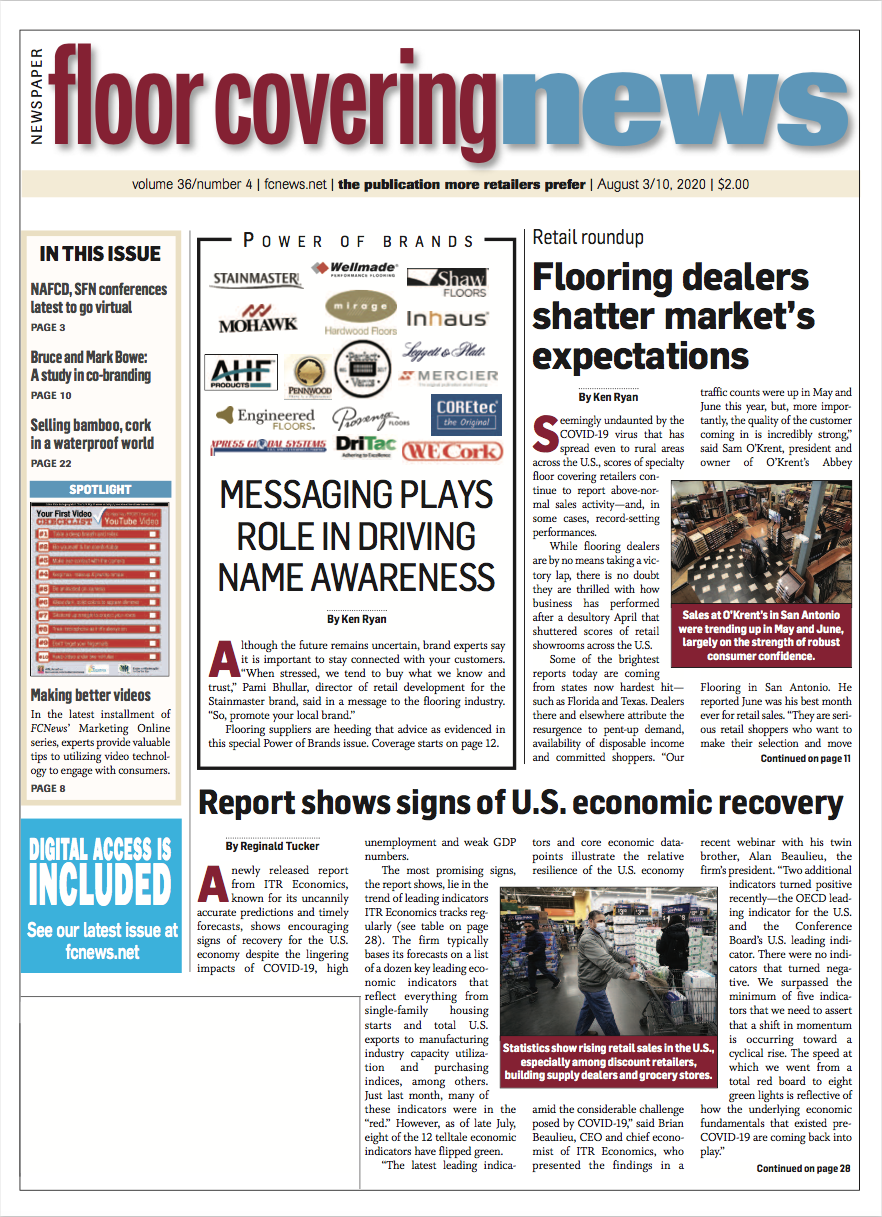By Reginald Tucker
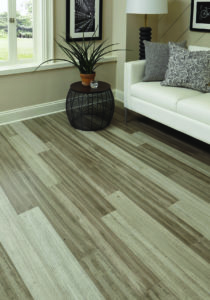
LVT, along with its various iterations, has led the flooring industry in terms of dollar and volume growth as well as its share of the retail showroom space. That’s due in large measure to the well-documented waterproof attributes LVT, WPC and SPC products provide. But that doesn’t mean retailers shouldn’t consider showcasing other hard surface alternatives on the show floor.
Bamboo and cork flooring are two such categories. Thanks to innovations in visuals, durability, resilience and even hygienic properties, suppliers are looking to give retailers, specifiers and consumers more reasons to take another hard look at bamboo and cork.
One area where suppliers say these alternatives can effectively compete is performance. Case in point is Wellmade Performance Flooring’s HDPC strand bamboo offering. According to Steve Wagner, director of sales and marketing, the product is fully waterproof—a trait that helps it compete toe to toe with virtually any product on the market and virtually eliminates moisture-related flooring failures. “The product is perfect for areas prone to moisture, like kitchens, bathrooms and basements,” he said. “Plus, click installation (without acclimation) is quick and easy, and HDPC strand is damp-mop approved for easy cleaning.”
The benefits don’t end there, Wagner said. Bamboo, he noted, still represents a great eco-friendly option. And because the wear layer is natural, repeat patterns are eliminated. “The next generation of bamboo flooring definitely deserves a second look from retailers,” he said. “Wellmade is producing natural strand on a HDPC platform that has all the performance benefits associated with rigid core products.”
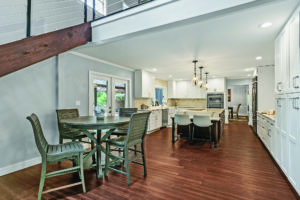
Other major suppliers of bamboo flooring are also looking to drive continued interest in bamboo by touting the category’s inherent features and benefits. In the case of Cali Brands, the product’s durability is the key driver. The company boasts having one of the strongest bamboo flooring products available with a Janka hardness scale rating of 5,500—that’s four times harder than oak. “Both residential and commercial customers opt for our fossilized bamboo namely for this extreme durability,” said Laura Nieto, communications and public relations specialist.
And like Wellmade, Cali Brands is also touting bamboo’s aesthetic attributes. While Nieto agreed there have been incredible advancements in wood imaging technology in real-wood vinyl look-alikes, she said it’s still hard to beat the real thing. “There remains a solid segment of customers who prefer natural materials and want that richer, more organic aesthetic,” she explained. “Despite Cali Vinyl’s skyrocketing success, bamboo flooring—both in solid and engineered—remains a big part of our business.”
And let’s not forget about the eco-friendly traits of the product. “Conventional wood flooring sources material from trees that take 30-50 years to reach their full mass, but bamboo can be continuously reharvested every three to five years without harming the plant’s system or surrounding habitat,” Nieto said.
Cork bounces back
In much the same way that bamboo suppliers are leveraging the performance, aesthetic and eco- friendly attributes of the category to entice retailers and consumers, cork flooring producers and marketers are working hard to keep that category top of mind. If waterproof is what consumers want, then cork certainly delivers, suppliers say.
“There’s a reason this product has been around for 150 years,” said Ann Wicander, president of We Cork. “Cork is naturally waterproof given its natural ability to seal at the seams—spills don’t affect the floor. You can even install it using a waterproof adhesive and seal it with a waterproof urethane. It’s like the cork stopper in the wine bottle; it expands and provides a waterproof seal.”
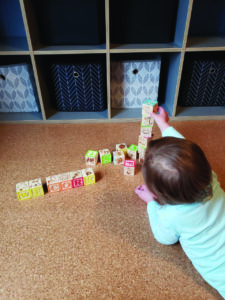
We Cork’s latest salvo in the waterproof flooring battle is a product called Corkoleum, a durable, waterproof, glue-down offering that’s ideal for a variety of scenarios such as bathrooms, kitchens, living rooms and bedrooms, as well as light-commercial applications such as gyms, physiotherapy rooms and libraries. “It will last as long as the building,” Wicander said.
The product’s resistance to moisture is not the only draw. Cork also provides sound dampening as well as thermal insulation. (It helps retain both the heat in winter and the coolness in summertime when the air conditioner is running.) Plus, it’s also more comfortable underfoot.
“Cork is a great way to insulate sound within the room and above the ceiling—especially if you need to be isolated from the kids when you’re working,” Wicander explained. “It’s also ideal for an aging population who might be looking for something that’s more comfortable than SPC.”
An added bonus for the specialty dealer, according to Wicander, is the profit opportunity. With WPC and SPC approaching commodity status, cork—a natural material that’s green and renewable—can boost the retailer’s profit margin. “Dealers can make 40%-60% margin with our product,” she said. “And since it requires more skilled labor, the retailer can charge more for installation.”
And let’s not forget about the aesthetic appeal that many of today’s cork products offer. Thanks to advancements in screening and digital printing technologies, cork can be visually altered to mimic virtually any surface or material—natural or otherwise. This addresses one of the major disadvantages of cork flooring for traditionalists—who may embrace the eco-friendly benefits for which the product is known, but have possibly grown tired of the original, dated cork look.
A prime example of this innovation can be found in the newly launched Green Flow program from Calgary, Canada-based Opus Floors, a supplier of several innovative hard surface products, including cork. “Most visuals currently available in cork resemble the natural cork look, but with our ultra-high-resolution digital print program, we can offer retailers everything from wood visuals to concrete looks to natural mosaic patterns,” said Vern Verkley, owner. “The digital technology used in producing the visuals for the product offers fewer repeats in the patterns, making for a more beautiful, natural looking floor.”
It’s an area where several cork suppliers say they are focusing their attention. “With today’s printing technology, you can have any visual you want,” We Cork’s Wicander said. “We have the capability to offer design customization for our clients.”
Ongoing innovations
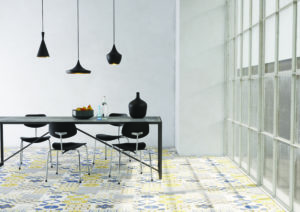
Advancements in cork go well beyond designs and waterproof performance. Suppliers have also made improvements in areas such as core construction and antimicrobial technologies.
At Ecore, for instance, the company incorporated cork and vulcanized composition rubber to produce a beautiful and sustainable floor that rivals the acoustic properties found in traditional resilient flooring. The new product line, called Origins, is 3.2mm thick and is available in 12 x 24-inch tiles that can be installed in a brick/subway or herringbone pattern.
With respect to antimicrobial enhancements, Torlys is looking to raise the ante with its CorkWood line. The engineered product, which features a real cork veneer, combines the beauty of hardwood, the durability of laminate and the comfort of cork. But the main feature, according to Peter Barretto, president and CEO of Torlys, is the CorkPlus Blue backing, which boasts Microban technology designed to inhibit the growth of mold.
“One of the biggest challenges the industry faces with waterproof is mold and mildew problems when it gets under the floor,” he explained. “We’ve been focusing on Microban to make sure we don’t have those problems. We’ve been featuring it for several years now, but you’re going to see us doubling down on antimicrobial technology moving forward.”

